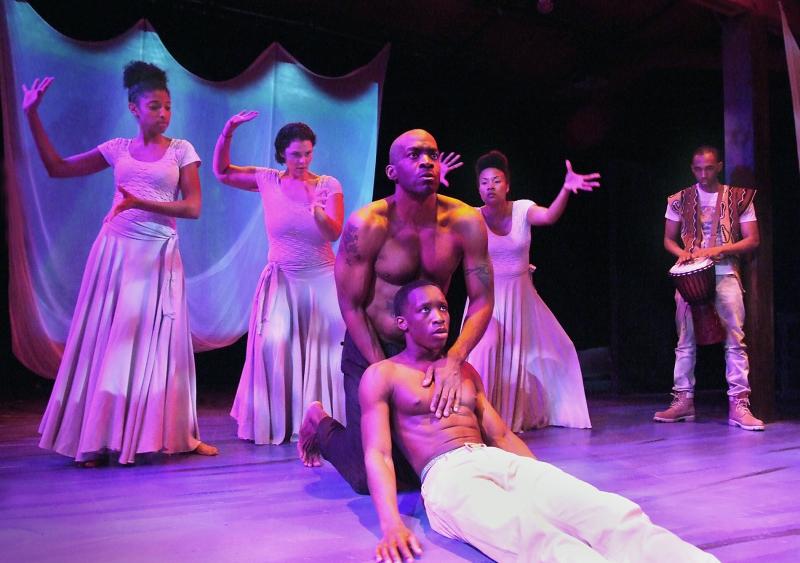'Dontrell, Who Kissed The Sea' Is A Masterpiece In Progress

“Dontrell, Who Kissed The Sea,” directed by Gregory Wallace and presented by the Lower Depth Theatre Ensemble at the Skylight Theatre, blends the visionary world of Dontrell’s dreams with the very youthful and down-to-earth world that is that of an 18-year-old boy in America. Brilliantly played by current USC student Omete Anassi in his professional debut, Dontrell mixes boyishness with profundity throughout the narrative as he navigates his family, his future, and most importantly, his past.
Awakening from his powerful dream, Dontrell embarks on an aggressively spontaneous desire to journey into the ocean and connect with his ancestor, despite the fact that he cannot swim. After nearly drowning in a community pool, Dontrell is rescued by a young, white life guard, Erika (Haley McHugh), who promises to teach Dontrell how to swim. The two eventually develop a clunky romantic relationship with one another that pushes Dontrell to pursue his dreams with unquestioned ferocity, despite the disapproval of his mother (Benai Boyd).
SEE ALSO: Has Actors' Quity Sounded A Death Knell For Small L.A. Theaters?
While the show includes a truly stellar cast — Benai Boyd as the commanding and caring mother, Marlon Sanders as the quiet yet powerful father, Charles McCoy as the charming, childhood friend — the play falls short in their development. This is seen most obviously in the father character, whose back faces the audience for a majority of the show until he unexpectedly explodes at Dontrell, lecturing him on the importance of “warrior bitches.” When the father does finally join in the action, he is profound, and is given some of the best dialogue in the play, but his lack of development throughout the rest of the show make his monologue seem less organic to the narrative.
Likewise, the Erika character seems oddly out-of-place, and not just because she’s the only white member of the cast. Her purpose seems clear at first, she is there to teach Dontrell how to swim and help him achieve his goal, but the transition into a romantic relationship between the two seems both unnecessary and artificial. Playwright Nathan Alan Davis explained that because he himself is mixed race, he felt “Dontrell and Erika coming together to take on this impossible quest, of two ethnicities working together to forge a new reality” was an important element that needed to be “woven into the story.” But in its execution, the fact that Dontrell and Erika are a mixed race couple plays no role in the progression of the narrative, where it has all the potential in the world to do so. Furthermore, it hoenstly seems a bit odd that Dontrell's white girlfriend is the only one who can ultimately enable him to discover his blackness by way of his African ancestors, with the unappealing — and likely unintentional — hint of the white savior complex.
SEE ALSO: USC Alumna Sabina Zuniga Varela Shares Her Personal Story And Her Role In 'Chavez Ravine'
Surprisingly, the most compelling element of the show is seen in the choreography (by Ayana Cahrr) which beautifully uses dance and movement to communicate emotions that are not clearly expressed in the text. While "Dontrell, Who Kissed The Sea" is certainly not a 'dance show,' it successful incorporates West African dance into the narrative, bringing the show back to its core. The way that the actors move throughout the set (beautifully designed by Stephanie Kerley Schwartz) is poetic and enchanting, adding layers of needed depth where the story gets shallow. Likewise, the lighting design (Jeff McLaughlin) and the sound design (David B. Marling) illuminate the endless potential of the play, elevating its meaning to a level wiser than that of its sometimes confusing script.
Despite its imperfections, “Dontrell, Who Kissed The Sea” is a diamond in the rough that just scratches the surface of endless possibility. The story is a beautiful one that holds a special sort of resonance with the realities black Americans face today in light of our unjust past. Nathan Alan Davis demonstrates his talent through the many important subjects brought up throughout his play, leaving the audience to desire a more throughout dissections of those subjects. Simply put, “Dontrell, Who Kissed The Sea” is a visually stunning production with a powerhouse cast and a refreshing script that, with a few edits, could truly reveal itself as a masterpiece of African American theater.
"Dontrell, Who Kissed The Sea" is playing at the Skylight Theatre Complex (1816 N Vermont, Los Angeles) through March 29. Tickets are $30-$34. For more information visit SkylightTheatreCompany.com
Contact Theater Editor Savannah L. Barker here
For more Theater & Dance coverage click here



